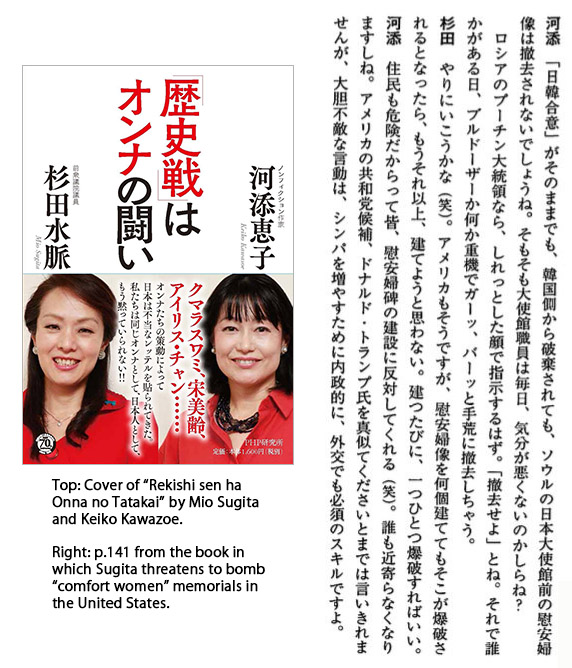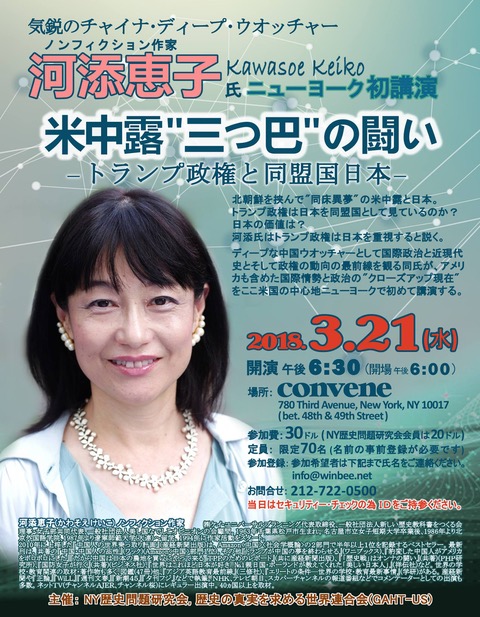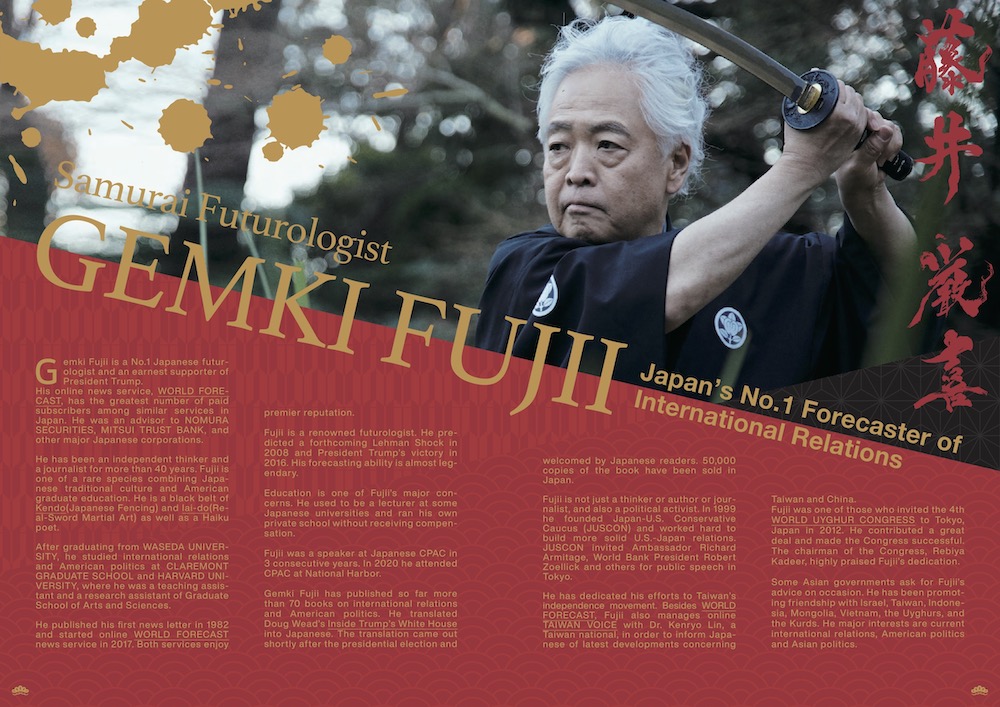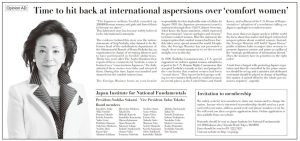Keiko Kawasoe (河添恵子) is a self-described “non-fiction writer” and a comfort women denier.
In the book “Women Fight the History War” (Rekishisen ha onna no tatakai), Kawasoe and co-author Mio Sugita propose bombing attacks against comfort women memorials erected in the United States. “Nearby residents will oppose further construction of comfort women memorials out of fear!” exclaims Kawasoe.
In the same book, Kawasoe warns readers of an “Illuminati conspiracy” aimed at turning Japan into a “gender-free communist state.”
Kawasoe has also provided a promotional blurb for a fake “spiritual interview” book published by Happy Science on “The Rape of Nanking” author Iris Chang in which Chang’s “spirit” confesses to fabricating historical accounts of Japanese military atrocities in Nanking to defame Japan.
In March 2018, Kawasoe joined Global Alliance for Historical Truth’s panel titled “The Role of Women in Japan” during the 2018 United Nations Commission on the Status of Women NGO Parallel Events in New York. While there, she also gave a talk at another event organized by GAHT and New York Historical Issues Study Group for Japanese audience.


Miroslav Marinov is the author of two self-published non-fiction books and a comfort women denier. He is married to a Japanese woman, Toshie Marinov, who is also a comfort women denier affiliated with Nadeshiko Action. Miroslav Marinov’s article on UNESCO has appeared in Seiron, a monthly conservative opinion magazine published by the Sankei Shimbun company.
In 2016 he authored a letter critical of the UNESCO Memory of the World Register in general and of the proposal to introduce historical documents on comfort women to the Register in particular. The letter was sent on behalf of the Canada-Israel Friendship Association, for which Marinov is a board member, even though it is not clear if anyone other than Marinov is involved in the comfort women denial.
One of Marinov’s arguments in the letter was that comfort women cannot be “sex slaves” because some comfort women were paid for their service (before they were taken away to repay debt and pay for necessities) and therefore the Japanese military comfort women system is not comparable to the war crimes of the Nazi Germany. He however neglects the fact that the Nazi Germany introduced currency systems at many of its concentration camps, paying incarcerated laborers tokens for the work they performed in order to increase productivity and reduce riots.
Sankei Shimbun promoted Marinov’s letter as an evidence that international Jewish community agreed with Japan’s right-wing historical revisionists, but failed to mention Marinov by name or the fact that he was a contributor to its magazine while reporting about it.
In addition to Japanese war crime denial, his personal blog is filled with racist and otherwise hateful attacks on African Americans/Canadians, Muslims, LGBTQ people, and others. He crowd-funded his previous books claiming that he suffered from censorship by politically correct editors at mainstream publishing industry.
Seiji Yoshida (吉田清治) is the author of the 1983 “My War Crime,” in which he confessed is role in recruiting women to become comfort women in Jeju Island, Korea during the WWII through force, fraud, and coercion. In the early 1990s accuracy of some or most parts of the book have been called into question, leading both conservative and progressive historians to dismiss the book as a reliable source of historical knowledge by the mid-1990s.
Right-wing comfort women deniers portray Yoshida as the only or primary source on the historical orthodoxy on comfort women, arguing that the dismissal of Yoshida leaves us with no evidence that indicate any wrongdoings by the Japanese military. But researches have considerably advanced since the early 1990s especially after survivors of Japanese military comfort women began speaking out publicly, and the historical consensus on comfort women at least since mid-1990s have not relied on Yoshida in any way. In fact, it is partly these testimonies and researches that proved that Yoshida’s story was unlikely to be accurate.
The right-wing narrative also cannot explain why there was little national or international attention to the issue of comfort women, even after the publication of Yoshida’s book, until survivors began speaking out in the early 1990s if Yoshida was so foundational in our understanding of comfort women.
Under pressure from right-wing critics who blame Asahi Shimbun newspaper for “fabricating” the comfort women issue when it published stories that reported Yoshida’s testimony in the 1980s, in August 2014 the newspaper formally retracted a series of articles mentioning Yoshida, despite the fact that Asahi‘s reporting at the time was no different from those of other publications at the time, and the newspaper had already reported in March 1997 that Yoshida’s testimony had been questioned by experts and that he had refused to defend his claims in the book, after which Asahi stopped quoting or citing Yoshida.
Kazuyoshi Hanada (花田紀凱) is a right-wing magazine editor and comfort women denier. He has been the editor-in-chief of several magazines, most recently for the right-wing WiLL (2004-2016) and Monthly Hanada (2016-).
In 1995 Hanada was the editor-in-chief of Marco Polo, a monthly men’s magazine, which published an article disputing the existence of gas chambers at Nazi concentration camps. After international criticisms, he was fired and the magazine was discontinued.
In 2006 as the editor-in-chief of WiLL, Hanada wrote an internet rumor about the former leader of the Social Democratic Party being a Korean as a fact. The court determined the article to be an obvious falsehood and ordered Hanada to pay compensation.
Hanada was a co-singer to Channel Sakura’s letter protesting the U.S. H.Res.121 demanding Japan to “accept historical responsibility” for the treatment of comfort women.
Miki Otaka (大高未貴) is a conservative journalist, Channel Sakura host, and a comfort women denier. She is a frequent contributor to conservative publications including Sankei Shimbun’s Yukan Fuji and Seiron.
In October 2013, Otaka reported in her show on Channel Sakura that Japanese children are being bullied in Glendale after the city enacted a comfort women memorial earlier that year. After Japanese residents in the area questioned the story, the video of the program was pulled from the internet. The claim has been thoroughly debunked by local authorities, schools, national media, and Japanese American groups.
Website: http://www.miki-otaka.com
Kohyu Nishimura (西村幸祐) is a journalist who has covered sports until the 2002 World Cup Soccer co-hosted by Japan and South Korea, which apparently turned him into a critic of Korean culture and society. He has contributed nationalistic articles to conservative magazines such as Seiron and WiLL and was the founding editor in chief of far-right nationalist magazine JAPANISM.
Nishimura is a member of Committee for Historical Facts, the group responsible for comfort women denier opinion ads The Facts (2007) and Yes, we remember the facts. (2012). He characterizes international criticisms against Japan’s handling of the comfort women issue as the “intelligence warfare” conducted by “anti-Japanese fascists.”
Nishimura is credited as the supervising editor for the comfort women denier Tony Marano’s 2014 book, “Okore! Wana ni kakatta nihonjin (Get enraged! Japanese people caught in a trap).”
Akiko Okamoto (岡本明子) is a conservative writer and activist previously affiliated with Japan Conference who served as the founding secretary general of Japan Family Value Society. As a writer, she was influential in the anti-feminist (or anti- so-called “gender free” movement) backlash in the mid-2000s. She was one of the first Japanese conservative activists to lobby at various United Nations committees, and assisted other conservative activists and groups including comfort women deniers to do the same.
Okamoto was also among the first to call attention to the establishment of comfort women memorials in the U.S. as a threat to Japan’s national pride. In the May 2012 issue of Seiron, a conservative opinion magazine, Okamoto warned how Japan was losing ground in the U.S. and in the United Nations on the issue of comfort women as evidenced by the establishment of a comfort women memorial in Palisades Park, New Jersey, even as the Japanese conservatives consolidated their dominance over domestic discourse over comfort women. Her article served as a rallying cry for Japanese conservatives and comfort women deniers to begin propagating “Japan’s position” regarding comfort women at the United Nations and in foreign media.
Okamoto herself appears to be largely retired from public involvement in conservative politics, but her successor Kiyoshi Hosoya of FAVS and other conservative activists continue to lobby against comfort women at the United Nations level.
Genki Fujii (藤井厳喜), alternatively spelled Gemki Fujii and also known as Noboru Fujii (藤井昇), is a conservative political commentator and comfort women denier (no relation to Mitsuhiko Fujii). He ran unsuccessfully for the parliament twice under Sunrise Party of Japan (たちあがれ日本) in 2010 and Japan Innovation Party (日本維新の会) in 2012. Fujii is on the board of Global Alliance for Historical Truth.
Fujii is the founder and owner of Cambridge Forecast Group of Japan, which includes publishing company Direct Publishing and online channel World Forecast. Direct Publishing published the Japanese translation of “Inside Trump’s White House: The Real Story of His Presidency” written by conservative political commentator Doug Wead.
Fujii’s Direct Publishing offers his book, “Nihon jin ga shiranai taiheiyou sensou no oouso” (日本人が知らない太平洋戦争の大嘘, Big Lies about the Pacific War that Japanese People Do Not Know) for free on its website (550 yen or about $5.50 for shipping and handling required) in which Fujii advances heterodox claims such as that President Franklin D. Roosevelt conspired with the Chinese to entrap Japan into the WWII, or that the U.S. ignored Japan’s offer to surrender toward the end of the WWII until after atomic bombs could be used.
Fujii has spoken at J-CPAC (later renamed CPAC Japan) held by Japanese Conservative Union, and his company is a “Presenting Sponsor” for the (American) CPAC 2021 which is the second highest sponsorship level said to cost $125,000.


Shigeharu Aoyama (青山繁晴) is a conservative political commentator turned politician and a comfort women denier.
After visiting San Jose, California, Aoyama claimed to have heard first-hand testimonies about bullying experienced by Japanese children in the U.S. resulting from the construction of comfort women memorial in Glendale, California, which is over 300 miles away from San Jose. When the group of Japanese parents in San Jose who had sponsored Aoyama’s visit publicly contradicted his statement, he backtraced the comment, saying that the bullying stories were from elsewhere, even though he had not visited Glendale or anywhere near comfort women memorials in the U.S. by that time.
In June 2016, Aoyama ran for the House of Councilors and won a six-year term.
Yoshiko Sakurai (櫻井よしこ) is a journalist and comfort women denier who runs Japan Institute for National Fundamentals, a conservative think tank with close ties to Japan Conference. Through Genron TV: Sakura Live, her internet broadcasting platform and in publications, Sakurai promotes conservative social and economic policies as well as nationalistic military and foreign affairs policies.
Sakurai is a member of the Committee for Historical Truth which published paid opinion advertisements in U.S. media such as The Facts (2007) and Yes, we remember the facts. (2012). She paid or offered to pay a large sum of cash to Michael Yon to give a talk at the Japan Institute for National Fundamentals and to publish comfort women denial in Western media, before her support for Yujiro Taniyama’s film, Scottsboro Girls, led Yon to publicly criticize her.
Yoshiko Sakurai has no relationship to Makoto Sakurai of Zaitokukai.






